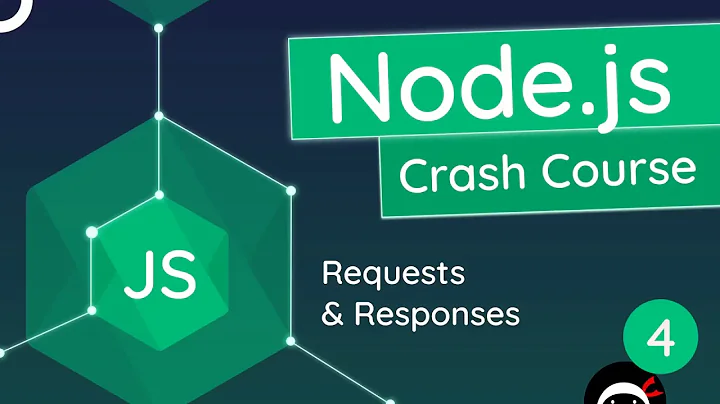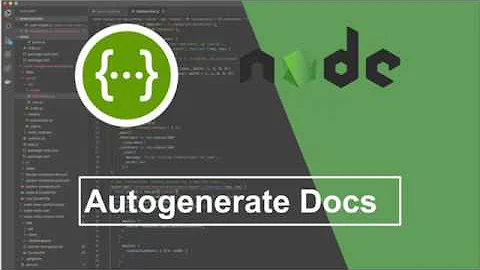Node.js request object documentation?
Solution 1
I'm not sure if this is a correct reply as it seems straightforward to me, but did you have a look at http://nodejs.org/api/http.html#http_http_incomingmessage?
Request is instance of the above object. By the way, if you really want to see what's inside that object with "brute force," you should not parse it, as it will not be a JSON string at all, but instead do something like:
for (i in request) {
//Your code here
}
Hope it helps.
Solution 2
Just to add on, as a relative newbie in Node.js, I find it confusing that each framework has its own implementation of a "request" object.
For example,
Express: http://expressjs.com/api.html#req.param
and
Hapi: http://spumko.github.io/resource/api/#request-object (just to note that the raw request object is still available in request.raw.req)
Some libraries assume the presence of Express' "req.param" method, and fail when used in non-Express projects.
Solution 3
I agree with Delio, the Request object is of type IncomingMessage object, which is created by http.ClientRequest.
Related videos on Youtube
Benjamin Collins
My name is Benjamin Collins , I'm a Web Software Developer. My main focus is on client side Javascript, but I'm also comfortable with ServerSide Nodejs and PHP, and the Databases MariaDB and MongoDB. My free time is devoted to writing documentation for how to use OpenGL in C on Linux for the Raspberry Pi, and supporting various 3d formats.
Updated on October 26, 2020Comments
-
 Benjamin Collins over 3 years
Benjamin Collins over 3 yearsThis is a pretty straight forward question, but I haven't found anything on Google. I'm looking for documentation on the request parameter in Node.js's create server function, but I haven't been able to find anything.
http.createServer(function(request, response){ console.log(JSON.stringify(request)); });Debugging with JSON.stringify() gives me an error, that the object is circular and the program stops. I've seen different things like
request.url, orrequest.body, but is there a page documenting all of the request functions and parameters? It seems like it should be easy to find, I just can't seem to find it.I tried it again, and it turns out just doing
console.log(request)writes out all of the data from the request. Here it is just as a reference:ondata: [Function], _httpMessage: { domain: null, _events: [Object], _maxListeners: 10, output: [], outputEncodings: [], writable: true, _last: false, chunkedEncoding: false, shouldKeepAlive: true, useChunkedEncodingByDefault: true, sendDate: true, _hasBody: true, _trailer: '', finished: false, _hangupClose: false, socket: [Circular], connection: [Circular] } }, connection: { _connecting: false, _handle: { fd: null, writeQueueSize: 0, owner: [Circular], onread: [Function: onread], reading: true }, _readableState: { highWaterMark: 16384, buffer: [], length: 0, pipes: null, pipesCount: 0, flowing: false, ended: false, endEmitted: false, reading: true, calledRead: true, sync: false, needReadable: true, emittedReadable: false, readableListening: false, objectMode: false, defaultEncoding: 'utf8', ranOut: false, awaitDrain: 0, readingMore: false, decoder: null, encoding: null }, readable: true, domain: null, _events: { end: [Object], finish: [Function: onSocketFinish], _socketEnd: [Function: onSocketEnd], drain: [Function: ondrain], timeout: [Function], error: [Function], close: [Object] }, _maxListeners: 10, _writableState: { highWaterMark: 16384, objectMode: false, needDrain: false, ending: false, ended: false, finished: false, decodeStrings: false, defaultEncoding: 'utf8', length: 0, writing: false, sync: true, bufferProcessing: false, onwrite: [Function], writecb: null, writelen: 0, buffer: [] }, writable: true, allowHalfOpen: true, onend: [Function], destroyed: false, errorEmitted: false, bytesRead: 357, _bytesDispatched: 0, _pendingData: null, _pendingEncoding: '', server: { domain: null, _events: [Object], _maxListeners: 10, _connections: 1, connections: [Getter/Setter], _handle: [Object], _usingSlaves: false, _slaves: [], allowHalfOpen: true, httpAllowHalfOpen: false, timeout: 120000, _connectionKey: '4:0.0.0.0:1337' }, _idleTimeout: 120000, _idleNext: { _idleNext: [Circular], _idlePrev: [Circular], msecs: 120000, ontimeout: [Function: listOnTimeout] }, _idlePrev: { _idleNext: [Circular], _idlePrev: [Circular], msecs: 120000, ontimeout: [Function: listOnTimeout] }, _idleStart: 1371952289619, parser: { _headers: [], _url: '', onHeaders: [Function: parserOnHeaders], onHeadersComplete: [Function: parserOnHeadersComplete], onBody: [Function: parserOnBody], onMessageComplete: [Function: parserOnMessageComplete], socket: [Circular], incoming: [Circular], maxHeaderPairs: 2000, onIncoming: [Function] }, ondata: [Function], _httpMessage: { domain: null, _events: [Object], _maxListeners: 10, output: [], outputEncodings: [], writable: true, _last: false, chunkedEncoding: false, shouldKeepAlive: true, useChunkedEncodingByDefault: true, sendDate: true, _hasBody: true, _trailer: '', finished: false, _hangupClose: false, socket: [Circular], connection: [Circular] } }, httpVersion: '1.1', complete: false, headers: { host: 'localhost:1337', connection: 'keep-alive', 'cache-control': 'max-age=0', accept: 'text/html,application/xhtml+xml,application/xml;q=0.9,*/*;q=0.8', 'user-agent': 'Mozilla/5.0 (Windows NT 6.1) AppleWebKit/537.36 (KHTML, like Gecko) Chrome/27.0.1453.116 Safari/537.36', 'accept-encoding': 'gzip,deflate,sdch', 'accept-language': 'en-US,en;q=0.8,ja;q=0.6' }, trailers: {}, _pendings: [], _pendingIndex: 0, url: '/', method: 'GET', statusCode: null, client: { _connecting: false, _handle: { fd: null, writeQueueSize: 0, owner: [Circular], onread: [Function: onread], reading: true }, _readableState: { highWaterMark: 16384, buffer: [], length: 0, pipes: null, pipesCount: 0, flowing: false, ended: false, endEmitted: false, reading: true, calledRead: true, sync: false, needReadable: true, emittedReadable: false, readableListening: false, objectMode: false, defaultEncoding: 'utf8', ranOut: false, awaitDrain: 0, readingMore: false, decoder: null, encoding: null }, readable: true, domain: null, _events: { end: [Object], finish: [Function: onSocketFinish], _socketEnd: [Function: onSocketEnd], drain: [Function: ondrain], timeout: [Function], error: [Function], close: [Object] }, _maxListeners: 10, _writableState: { highWaterMark: 16384, objectMode: false, needDrain: false, ending: false, ended: false, finished: false, decodeStrings: false, defaultEncoding: 'utf8', length: 0, writing: false, sync: true, bufferProcessing: false, onwrite: [Function], writecb: null, writelen: 0, buffer: [] }, writable: true, allowHalfOpen: true, onend: [Function], destroyed: false, errorEmitted: false, bytesRead: 357, _bytesDispatched: 0, _pendingData: null, _pendingEncoding: '', server: { domain: null, _events: [Object], _maxListeners: 10, _connections: 1, connections: [Getter/Setter], _handle: [Object], _usingSlaves: false, _slaves: [], allowHalfOpen: true, httpAllowHalfOpen: false, timeout: 120000, _connectionKey: '4:0.0.0.0:1337' }, _idleTimeout: 120000, _idleNext: { _idleNext: [Circular], _idlePrev: [Circular], msecs: 120000, ontimeout: [Function: listOnTimeout] }, _idlePrev: { _idleNext: [Circular], _idlePrev: [Circular], msecs: 120000, ontimeout: [Function: listOnTimeout] }, _idleStart: 1371952289619, parser: { _headers: [], _url: '', onHeaders: [Function: parserOnHeaders], onHeadersComplete: [Function: parserOnHeadersComplete], onBody: [Function: parserOnBody], onMessageComplete: [Function: parserOnMessageComplete], socket: [Circular], incoming: [Circular], maxHeaderPairs: 2000, onIncoming: [Function] }, ondata: [Function], _httpMessage: { domain: null, _events: [Object], _maxListeners: 10, output: [], outputEncodings: [], writable: true, _last: false, chunkedEncoding: false, shouldKeepAlive: true, useChunkedEncodingByDefault: true, sendDate: true, _hasBody: true, _trailer: '', finished: false, _hangupClose: false, socket: [Circular], connection: [Circular] } }, _consuming: false, _dumped: false, httpVersionMajor: 1, httpVersionMinor: 1, upgrade: false }-
jarmod over 10 yearsYou have my sympathy. Most modern languages, libraries, and frameworks have appalling reference documentation. If you visit the node documentation referred to below, you'll find that it's not actually a reference at all; it's more of a discussion. For example, the createServer() doc says that it takes as parameter "a function which is automatically added to the 'request' event" and returns "a web server object". There is no hint as to what 'type' either of these things is, and certainly no link to the reference doc for those things. What are they? F minus for the docs.
-
demongolem almost 5 yearsI read through the question, and it seems pretty reasonable to me. The problem here is that it is the responses which have taken this from a question to a conversation / pity party on horrible documentation. If a reasonable answer/explanation could be given, I think this question is salvageable. Perhaps even a new, related question is best.
-
 Benjamin Collins almost 5 yearsI asked this question 6 years ago. Since then I've gotten a lot more experience with reading through the Nodejs documentation, and who ever works on the Nodejs documentation has done a tremendous job of keeping it up to date and accurate. I think this question has gotten a lot of attention because it's a simple question, but it shows that there is a lot of information available through console.log in case you're stuck on something.
Benjamin Collins almost 5 yearsI asked this question 6 years ago. Since then I've gotten a lot more experience with reading through the Nodejs documentation, and who ever works on the Nodejs documentation has done a tremendous job of keeping it up to date and accurate. I think this question has gotten a lot of attention because it's a simple question, but it shows that there is a lot of information available through console.log in case you're stuck on something.
-
-
 Benjamin Collins about 11 yearsOops, I meant json.stringify, not json.parse. Went back to try the for(i in request) approach you mention and for some reason, just doing console.log(request) ended up working. I expected it to just say, [Object object]. Maybe it has a specific toString function for console? Thanks for the reply.
Benjamin Collins about 11 yearsOops, I meant json.stringify, not json.parse. Went back to try the for(i in request) approach you mention and for some reason, just doing console.log(request) ended up working. I expected it to just say, [Object object]. Maybe it has a specific toString function for console? Thanks for the reply. -
Thalis K. over 10 yearsBetter yet, to see what's inside any object, use util.inspect(). Util is a core module; you can simply
var util=require('util');and theutil.inspect(obj). A basic issue withJSON.stringify()is that it will complain if there are cyclic references. -
Muhammad Raihan Muhaimin over 10 yearsThank you very much for sharing the express api option.
-
Charles Holbrow almost 10 yearsThe spumko link is broken.
-
Charles Holbrow almost 10 yearsThe parse documentation is more complete than most: parse.com/docs/js/symbols/http.IncomingMessage.html
-
CaffeineAddiction almost 10 years
_readableState,readable,domain,_events,_maxListeners,socket,connection,httpVersion,complete,headers,trailers,_pendings,_pendingIndex,url,method,statusCode,client,_consuming,_dumped,httpVersionMajor,httpVersionMinor,upgrade,setTimeout,read,_read,destroy,_addHeaderLine,_dump,push,unshift,setEncoding,pipe,unpipe,on,addListener,resume,pause,wrap,setMaxListeners,emit,once,removeListener,removeAllListeners,listeners -
Jon Biz almost 9 yearsthat parse url is 404, fwiw
-
Wex over 8 yearsLink is outdated: nodejs.org/api/http.html#http_class_http_incomingmessage
-
B T over 7 yearsWhy would you ever use an http "framework"? Node.js does http natively.









